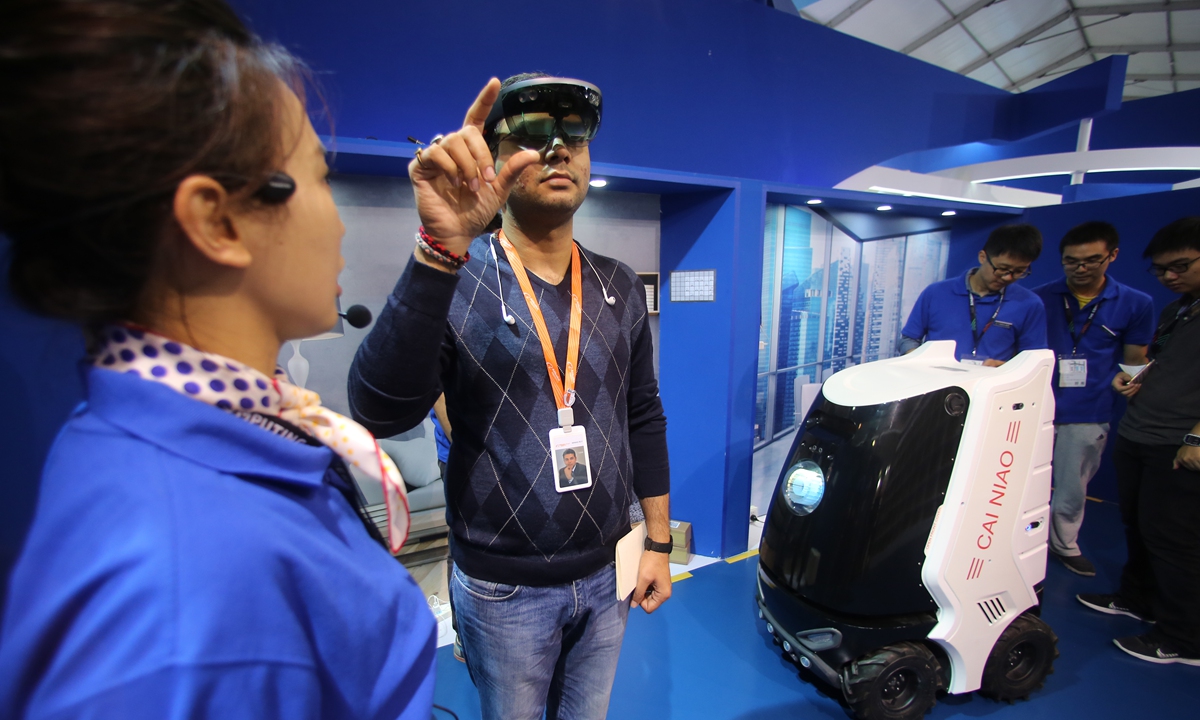What role will China's leading algorithm play in strategic competition with the US?
By GT staff reporters Source: Global Times Published: 2020/9/15 20:55:43

A visitor interacts with a robot arm at the first experience area featuring a 5G wireless network in Hangzhou, East China's Zhejiang Province on May 17, 2019. Photo: cnsphoto
Over the past months, the US heightened its crackdown on China's tech sector, bringing China's many leading online technologies under public spotlight, among which is the algorithm.
TikTok was reported to have rejected selling its core algorithm technology to a US firm after its parent company ByteDance said it would strictly follow the new Chinese regulations over restrictions on exports of certain technologies. Experts told the Global Times that competitive algorithm technologies of some Chinese tech giants are becoming a new target of the US in its war against China's tech rise.
China's algorithm technology is in a leading position globally, in contrast to the domestic chip industry which is years behind that of the US. As the trade war initiated by the US has spread to other fields including the tech industry, analysts said algorithm technology has become an important factor in the tech war and the selling of algorithm to foreign countries should not be allowed as it may harm China's national security.
Fang Xingdong, director of the Consortium of Internet and Society at the Communication University of Zhejiang, told the Global Times on Monday that algorithm technology is based on big data and China has obvious advantages in this area, especially in entertainment and lifestyle applications such as short videos, which have huge numbers of users.
"No country in the world is stronger than China in this field and even the US is not an opponent," he said.
US double standards
Fang told the Global Times that the TikTok algorithm is the app's core technology and the foundation of its success. "It is TikTok's advanced algorithm that makes its video content well organized and presented, so that it fits the tastes of global users," he said.
TikTok reportedly remained the world's most downloaded non-gaming app in August with more than 63.3 million installations in the month. It had surpassed 2 billion downloads by April amid the COVID-19 pandemic.
The US companies not only want to acquire TikTok's algorithm but also its huge user database, said TikTok user and IT expert Zhu Yikun, who designs intelligent navigation and Internet of Things (IoT) systems for civil airports.
"By fully analyzing and classifying its user data, the TikTok algorithm can build more accurate user portraits than its competitors do, and then it can have more accurate, personalized and optimized content that suits the demands of its users," Zhu told the Global Times.
He refuted the US accusation that TikTok's algorithm threatens the country's national security, saying it just reflects the US' double standards.
"Many American products, including Twitter and Facebook, have a large user base in many countries and the issue of them leaking users' data privacy has been exposed," he said. "On the one hand, US companies collect users' data from all over the world; while on the other hand, the US keeps accusing foreign companies of collecting American users' data."
Zhu said the while China's algorithm technology has made big breakthroughs, it can have further improvements. "There are still some shortcomings in the algorithm framework, such as in the Spilt Neural Network. Google and other US companies are more mature in this aspect," he said.
Zhu speculated that a key reason why the US wants to buy the TikTok algorithm is to get its users' data. "Tech companies like TikTok should not sell their algorithm tech. If it is sold, it will be easier for other countries to get our user data, which could pose challenges for our national security. If they master our algorithm technology, they can analyze and get users' personal information based on analyzing the data and if these users are related to national security, it may have a dangerous effect," Zhu said.
Zhu noted that in addition to algorithm technology, China also has a leading edge in 4G and 5G mobile networks, mobile data processing and network security protection, which are products derived from the development of big data and characterized by openness and sharing.

A deliveryman of a Chinese online takeaway service checks orders on the phone. Photo: IC
Mixed feelings
While the advanced algorithm recreated the digital lifestyle and brought convenience to the public, many have called for making better use of the algorithm and warned of being controlled by it.
Recently an article titled "The Deliveryman trapped in system" aroused heated discussion on Chinese social media. The article said due to the "enforcement" of the algorithm, food delivery has become a high-risk job. The algorithm provides the delivery couriers the quickest route and calculates the shortest time for them to arrive at the destination, but it fails to take real situations like the time for waiting for traffic lights and elevators into consideration.
The algorithm just "forces" the deliveryman to finish their task based on their calculation of efficiency without taking people's safety into account, said the article.
In addition to feeling sympathy for the deliveryman, many people began to reflect the justice of the practical use of the algorithm. The algorithm, based on big data, collects users' information and then provides services based on user's preference. But some question the morality of such a collection.
People enjoying personalized services at the cost of some personal information and privacy has become a global dilemma, Qin An, head of the Beijing-based Institute of China Cyberspace Strategy, told the Global Times Tuesday, saying the algorithm is a double-edged sword in this digital age when humans are highly dependent on the algorithm-based internet world.
With the largest group of internet users in the world at 904 million, China is developing its algorithm technologies based on the huge data of users, which has brought great convenience to the daily life in various aspects, Qin said.
Nonetheless, China's legal system on privacy protection is not perfect, and many domestic tech entrepreneurs lack the awareness of taking users' information seriously, Qin noted, suggesting China should step up strengthening legislation and professional ethics on digital privacy protection.
Qin also advised Chinese users to be more cautious when using applications. "It's better to carefully read the privacy policies of every application instead of simply skipping it and pressing the 'agree' button," he told the Global Times.
Newspaper headline: Targeted superiority
RELATED ARTICLES:
Posted in: IN-DEPTH